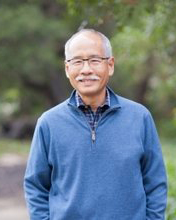Lee, Kai N.

Kai N. Lee
Dr. Kai Lee is a retired college professor and philanthropy program officer. He was the Program Officer of Science at the Packard Foundation and was the Rosenburg Professor of Environmental Studies at Williams College, a position he held for 16 years. Dr. Lee is the Managing Partner of Owl of Minerva, LLC, a consulting firm that works with philanthropic foundations, universities, and nonprofit organizations. One of Dr. Lee’s best-known books, Compass and Gyroscope (Island Press, 1993), is widely used in graduate environmental science courses.
Wong, C. P., Jiang, B., Kinzig, A. P., Lee, K. N., & Ouyang, Z. 2015. Linking ecosystem characteristics to final ecosystem services for public policy. Ecology letters, 18(1), 108-118.
Lee, Kai N. 2006. Urban sustainability and the limits of classical environmentalism. Environment and urbanization, 18(1), 9-22.
Lee, Kai N. 2001. Appraising adaptive management. In Biological diversity (pp. 3-26). CRC Press.
Lee, Kai N. 1993. Compass and Gyroscope: integrating science and politics for the environment (No. ISLAND-0380/XAB). Island Press, Washington, DC (United States).
Lee, Kai N., 1991. Rebuilding confidence: Salmon, science, and law in the Columbia Basin. Envtl. L., 21, p.745.
Dr. Kai N. Lee grew up in Manhattan, NY. He is the single child of a former United Nations employee, Chofeng Lin, and a business accountant in Chinatown, Hsin Chih Lee. Dr. Lee’s parents encouraged him to do well in school growing up.
In 1966, Dr. Lee graduated from Columbia University with a degree in Experimental Physics. Dr. Lee then attended Princeton University and graduated in 1971 with a Ph.D. in physics.
After earning his doctorate degree, Dr. Lee pursued his post-doctoral research fellowship at the University of California Berkeley. Soon after, he became an associate professor at the University of Washington. He taught at the University of Washington over 17 years, from 1973 to 1991. During this time, Dr. Lee was on the Northwest Power Planning Council board, where he oversaw the initial plans to restore salmon runs in the Columbia River drainage. From 1976 to 1977, he was a White House Fellow of the U.S. Department of Defense.
In 1980, Dr. Lee published his first book about electric power in the Pacific Northwest. In 1982, Dr. Lee published his second major publication, a discussion paper by the Northwest Power Planning Council, regarding the region’s future energy policy.
In 1991, Dr. Lee accepted a position at Williams College in Massachusetts as Director of the Center of Environmental Studies. He held the position from 1991 to 1998 and again from 2001 to 2002. Dr. Lee calls teaching at Williams the highlight of his career, and says it has offered both extraordinary challenges and rewards. Dr. Lee has stayed in the environmental field because he feels he is doing something worthwhile that would not be done otherwise. Dr. Lee was the Rosenburg Professor of Environmental Studies emeritus when he left Williams College in 2007 and retired from academia.
At both the University of Washington and Williams College, Dr. Lee taught introductory courses in environmental studies. The courses were the foundation of his book Humans in the Landscape: An Introduction to Environmental Studies, written with Richard Howarth and the late William Freudenburg (W.W. Norton, 2012).
In 1993, Dr. Lee wrote Compass and Gyroscope, published by Island Press. It is one of his best-known books that focuses on adaptive management. This book is widely used in graduate courses in environmental science. Compass and Gyroscope argues that public policy serves humanity’s future by adopting “social learning” into policymaking.
Throughout his career, Dr. Lee has been a member of more than a dozen committees of the National Academies of Science, Engineering & Medicine. He advises government agencies on several policies significantly impacted by scientific issues. His committee membership included the Board of Sustainable Development of the National Research Council, which contributed to Our Common Journey: A Transition Toward Sustainability. The book was published in 1999 and was an influential statement about sustainability science.
After retiring from academia in 2007, Dr. Lee joined the Packard Foundation as the Program Officer of Science. There, he developed new mechanisms to link knowledge and action so research funding could target new solutions and opportunities that have practical and near-term significance. Dr. Lee stayed at the Packard Foundation until 2015.
In 2016, Dr. Lee founded his own consulting firm, Owl of Minerva, LLC. The organization works with philanthropic foundations, universities, and nonprofit organizations. Owl of Minerva’s work included the review of the National Academies Review Draft Fifth National Climate Assessment.
Dr. Lee was the founding vice-chair of the National Academies of Science, Engineering & Medicine Committee that advised the U.S. Global Change Research Program. He served in the position until 2017. In this role, he was a chapter review editor for the Fourth National Climate Assessment. He was also on the U.S. Environmental Protection Agency Science Advisory Board.
Dr. Lee and his wife live in Piedmont, California. They have two grown daughters.
While at U.C. Berkeley for his post-doctoral fellowship at U.C. Berkeley, Dr. Lee met Dr. Todd Laporte, who mentored and introduced Dr. Lee to the environmental movement. Dr. Laporte is a political scientist who saw Dr. Lee’s potential and mentored him through his postdoc fellowship.
When Dr. Lee began working at the University of Washington, he worked closely with and was supported by two colleagues, Dr. Gordon Oreans, a biologist, and Dr. Don Matthews, a political scientist.
Dr. Lee believes that minority students bring important and different cultural and psychological perspectives to environmental studies. For this reason, during his academic career, Dr. Lee worked with and mentored many minority students through summer research projects.
Stanford University. (n.d.) COS Fellow: Kai Lee. Retrieved July 17, 2023 from https://oceansolutions.stanford.edu/people/kai-lee.
Kai Lee. (n.d.) Home [LinkedIn Page]. LinkedIn. Retrieved July 17, 2023 from https://www.linkedin.com/in/kai-lee-5a02126/.
Kai Lee. (2022, October 7). In Wikipedia. https://en.wikipedia.org/wiki/Kai_Lee